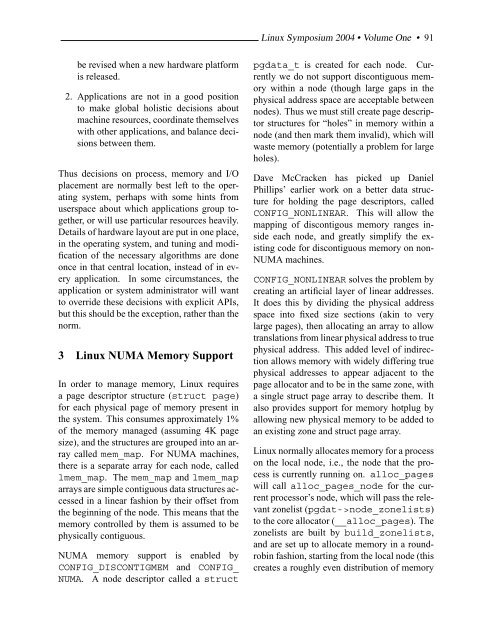You also want an ePaper? Increase the reach of your titles
YUMPU automatically turns print PDFs into web optimized ePapers that Google loves.
<strong>Linux</strong> Symposium 2004 • Volume <strong>One</strong> • 91<br />
be revised when a new hardware platform<br />
is released.<br />
2. Applications are not in a good position<br />
to make global holistic decisions about<br />
machine resources, coordinate themselves<br />
with other applications, and balance decisions<br />
between them.<br />
Thus decisions on process, memory and I/O<br />
placement are normally best left to the operating<br />
system, perhaps with some hints from<br />
userspace about which applications group together,<br />
or will use particular resources heavily.<br />
Details of hardware layout are put in one place,<br />
in the operating system, and tuning and modification<br />
of the necessary algorithms are done<br />
once in that central location, instead of in every<br />
application. In some circumstances, the<br />
application or system administrator will want<br />
to override these decisions with explicit APIs,<br />
but this should be the exception, rather than the<br />
norm.<br />
3 <strong>Linux</strong> NUMA Memory Support<br />
In order to manage memory, <strong>Linux</strong> requires<br />
a page descriptor structure (struct page)<br />
for each physical page of memory present in<br />
the system. This consumes approximately 1%<br />
of the memory managed (assuming 4K page<br />
size), and the structures are grouped into an array<br />
called mem_map. For NUMA machines,<br />
there is a separate array for each node, called<br />
lmem_map. <strong>The</strong> mem_map and lmem_map<br />
arrays are simple contiguous data structures accessed<br />
in a linear fashion by their offset from<br />
the beginning of the node. This means that the<br />
memory controlled by them is assumed to be<br />
physically contiguous.<br />
NUMA memory support is enabled by<br />
CONFIG_DISCONTIGMEM and CONFIG_<br />
NUMA. A node descriptor called a struct<br />
pgdata_t is created for each node. Currently<br />
we do not support discontiguous memory<br />
within a node (though large gaps in the<br />
physical address space are acceptable between<br />
nodes). Thus we must still create page descriptor<br />
structures for “holes” in memory within a<br />
node (and then mark them invalid), which will<br />
waste memory (potentially a problem for large<br />
holes).<br />
Dave McCracken has picked up Daniel<br />
Phillips’ earlier work on a better data structure<br />
for holding the page descriptors, called<br />
CONFIG_NONLINEAR. This will allow the<br />
mapping of discontigous memory ranges inside<br />
each node, and greatly simplify the existing<br />
code for discontiguous memory on non-<br />
NUMA machines.<br />
CONFIG_NONLINEAR solves the problem by<br />
creating an artificial layer of linear addresses.<br />
It does this by dividing the physical address<br />
space into fixed size sections (akin to very<br />
large pages), then allocating an array to allow<br />
translations from linear physical address to true<br />
physical address. This added level of indirection<br />
allows memory with widely differing true<br />
physical addresses to appear adjacent to the<br />
page allocator and to be in the same zone, with<br />
a single struct page array to describe them. It<br />
also provides support for memory hotplug by<br />
allowing new physical memory to be added to<br />
an existing zone and struct page array.<br />
<strong>Linux</strong> normally allocates memory for a process<br />
on the local node, i.e., the node that the process<br />
is currently running on. alloc_pages<br />
will call alloc_pages_node for the current<br />
processor’s node, which will pass the relevant<br />
zonelist (pgdat->node_zonelists)<br />
to the core allocator (__alloc_pages). <strong>The</strong><br />
zonelists are built by build_zonelists,<br />
and are set up to allocate memory in a roundrobin<br />
fashion, starting from the local node (this<br />
creates a roughly even distribution of memory

















